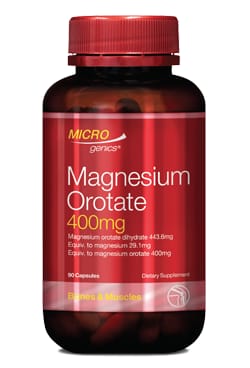Description
Magnesium orotate is a form of magnesium in which magnesium is bound to orotic acid. Magnesium is well absorbed in this form and does not cause any digestive upsets which may occur in other forms of magnesium23 (e.g. magnesium oxide), and is the best form of magnesium to support heart health
Supports energy production
Magnesium plays an essential role in the production of energy. Each cell in our body has a powerhouse called a mitochondria where energy is produced. If magnesium levels are below optimal, the cell has an impaired capacity to produce energy1.
Supports healthy muscle function to relieve muscle cramps
Magnesium plays an important role in muscle relaxation. If magnesium levels are below optimal, muscles can have difficulty relaxing. This could cause muscle cramps and spams, which can be very painful. Magnesium supplementation may be beneficial for those suffering from muscle cramps such as leg cramps2,3.
Menstrual cramps are a widespread problem. It is estimated that 45-95% of all women of childbearing age suffer from painful cramps with their monthly cycle. Menstrual cramps are caused by muscles in the uterus (womb) contracting4. A number of clinical studies have shown that supplementing with magnesium can be an effective way of treating menstrual cramps and lower back pain, if taken for six months.
Supports a healthy cardiovascular system
Magnesium can support heart health in many different ways. Research shows that people who took a magnesium supplement for six months had better blood vessel function and that their hearts showed less stress during treadmill exercise compared to the placebo group7. Studies have found that magnesium can act as a natural calcium channel blocker, increase nitric oxide, improve endothelial dysfunction, and induce direct and indirect dilation of the blood vessels. It is through these mechanisms that it can help to improve high blood pressure8,9 and significantly lower blood pressure10. Further research shows that magnesium can help lower elevated LDL cholesterol levels11,12. It has also been suggested that when magnesium is taken alongside the cholesterol-lowering Atorvastatin, it may help reduce muscle pain associated with statin-drug use13.
Supports nervous system health
Stress support – Magnesium works in many ways to support the nervous system. When we are stressed, our bodies produce more stress hormones such
as cortisol. This can create feelings of anxiety, memory loss, ‘brain fog’ and mood disorders such as depression14,15. Magnesium can restrict the release of stress hormones such as cortisol16 and thus help relieve any of the above symptoms associated with stress.
Helps improve moods – Magnesium plays an important role in mood regulation due to its involvement in the production of neurotransmitters. Magnesium stimulates the production of acetylcholine. Low levels of acetylcholine are associated with aggression and poor learning and memory17. Thus, increasing its production by supplementing with magnesium can help decrease feelings of anger, and improve learning and memory. Magnesium influences the production of serotonin, one of our ‘feel-good’ hormones. Low levels of magnesium have been associated with low moods, depression and anxiety18,19 and taking a magnesium supplements for only 2 weeks can already help improve moods20, though it is highly recommended to supplement for longer than that.
Helps improve migraines – Globally, 11% of the total adult population suffers from migraines, but it is more prevalent in women than men with a ratio of 3:1
General Inquiries
There are no inquiries yet.

Reviews
There are no reviews yet.